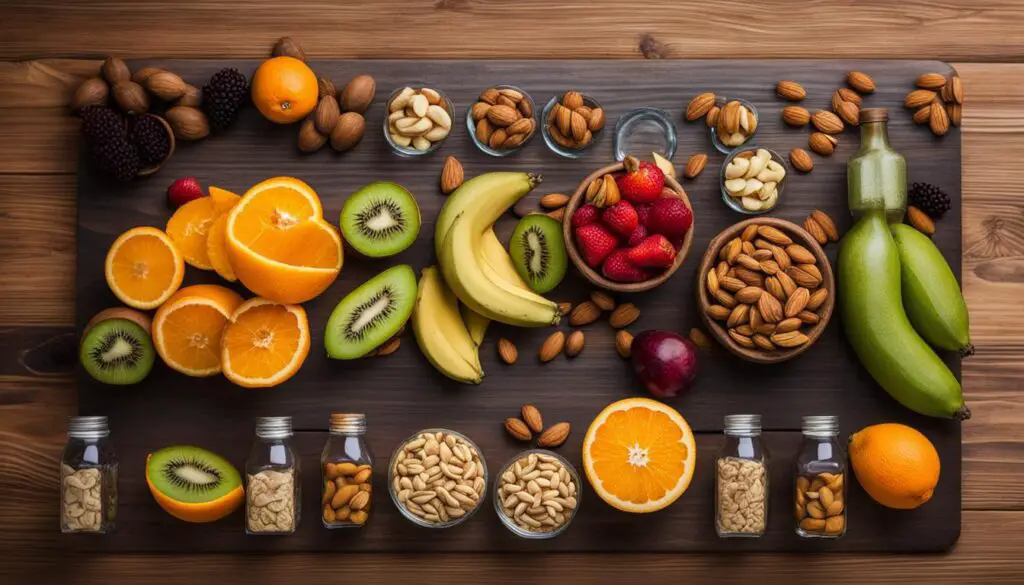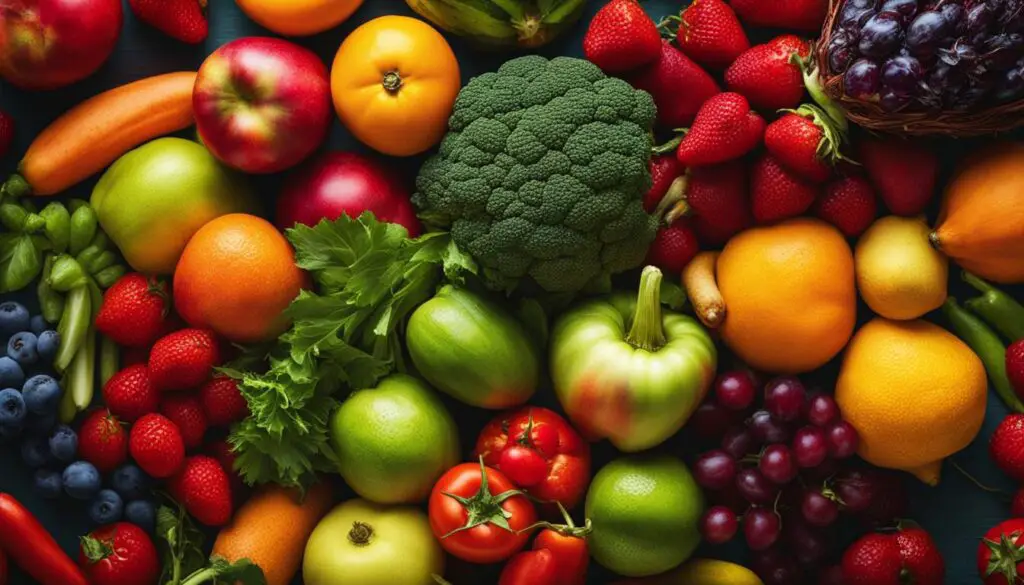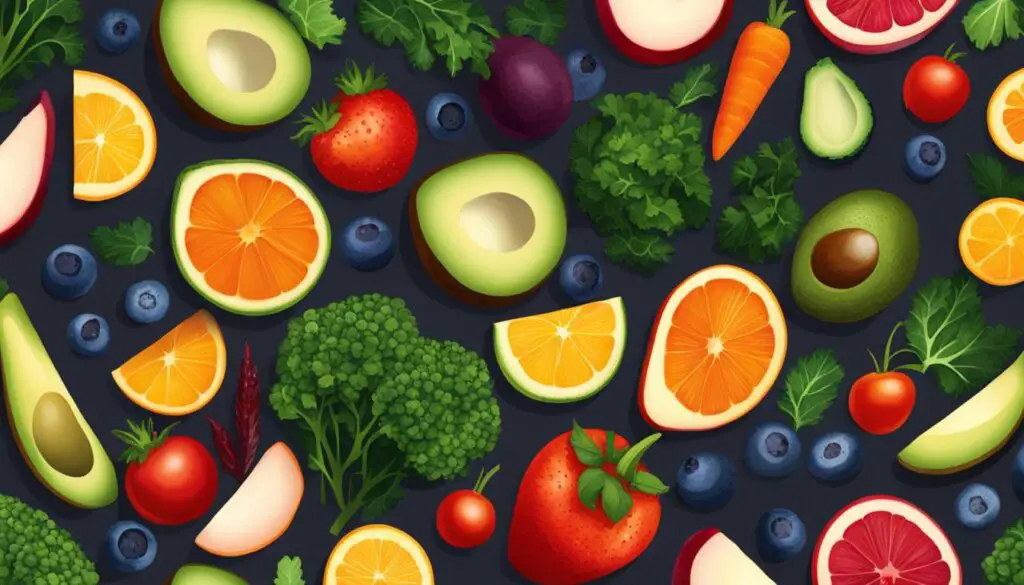The Best Food for Ultra Running (and Ultramarathon Training)
Welcome to our guide on the best food for ultra running and ultramarathon training. As experienced ultra runners, we know that proper nutrition plays a crucial role in maximising performance and preventing injury during long-distance running.
If you’re looking to take your training to the next level, this guide will provide you with the nutrition advice you need to fuel your body for success.
Ultra running is a demanding sport that requires immense physical and mental strength. Proper nutrition is essential for providing the energy and nutrients your body needs to perform at its best. In this guide, we will cover a range of topics related to ultra running nutrition, including carb loading, electrolyte balance, protein intake, nutritious snacks, special dietary considerations, superfoods, and more.
Key Takeaways:
- Proper nutrition is essential for success in ultra running and ultramarathon training.
- Carb loading can provide an energy boost and improve performance during long-distance runs.
- Maintaining electrolyte balance and hydration is crucial for preventing muscle cramps and dehydration.
- Protein is essential for muscle recovery after long runs and should be incorporated into your post-workout meals.
- Nutritious snacks can provide sustained energy during long runs and should be included in your fueling strategy.
Carb Loading for Improved Performance
When it comes to ultra running, carb loading is a well-established practice that can provide a much-needed energy boost during extended periods of exercise. Not only can carb loading improve performance, but it can also help prevent fatigue and reduce the risk of hitting the proverbial wall, or “bonking”.
So, what exactly is carb loading? Essentially, carb loading involves consuming a high-carbohydrate diet in the days leading up to a long-distance run. By doing so, you can increase your body’s glycogen stores, which serve as a vital energy source during exercise.
But what foods should you eat to achieve this high-carb diet? We recommend opting for complex carbohydrates, which provide sustained energy release, as opposed to simple carbohydrates, which can result in a quick spike and subsequent crash in blood sugar levels. Great options include whole grains, pasta, rice, potatoes, and sweet potatoes.
| Food item | Carbohydrate content (per 100g) |
|---|---|
| White bread | 50g |
| Brown bread | 40g |
| Plain bagel | 50g |
| Pasta (cooked) | 25g |
| Brown rice (cooked) | 23g |
In addition to complex carbohydrates, we also recommend incorporating high-calorie foods and energy boosters into your diet. Foods such as nuts, dried fruit, and energy bars can provide a quick and easy source of energy, while supplements such as caffeine can also provide a boost. However, be careful not to overdo it with caffeine, as too much can cause jitters and anxiety.
As with any major dietary change, it’s important to experiment with carb loading during training runs before incorporating it into a race day strategy. Everyone’s body responds differently, so it’s important to find what works best for you.
Remember, carb loading is just one part of a comprehensive nutrition plan for ultra running, and should be combined with proper electrolyte balance and hydration strategies, protein intake for muscle recovery, and sustained energy from nutritious snacks to keep you fuelled for those long-distance runs.
Electrolyte Balance and Hydration Strategies
When it comes to ultra running, maintaining proper electrolyte balance and hydration is crucial for performance and avoiding dehydration. In this section, we will discuss some hydration strategies and the best ways to rehydrate while on the go.
There are many options available for rehydration during long-distance runs, including sports drinks, coconut water, and plain water. Sports drinks, such as Gatorade and Powerade, are popular choices due to their high electrolyte content and added sugars for quick energy. However, it is important to choose a sports drink that is not overloaded with sugar, as excessive sugar intake can lead to a crash later on in the run.
| Electrolytes (mg) | Carbohydrates (g) | Calories (kcal) | |
|---|---|---|---|
| Sports drink (500ml) | 200-400 | 14-19 | 60-80 |
| Coconut water (500ml) | 600 | 26 | 186 |
| Plain water (500ml) | 0 | 0 | 0 |
Coconut water is another popular option due to its high potassium and magnesium content. These minerals are important for maintaining proper electrolyte balance and can help prevent cramping. However, coconut water tends to be more expensive than sports drinks and may not be as readily available.
Plain water is also a viable option for rehydration, but it does not provide any additional electrolytes or carbohydrates for energy. It is important to drink water regularly throughout the run to prevent dehydration and ensure proper bodily function.
When it comes to water intake, there is no one-size-fits-all recommendation. It is important to drink water regularly throughout the run and listen to your body’s thirst signals. As a general rule, aim to drink at least half of your body weight in ounces of water per day, and more if you are running in hot and humid conditions.

In addition to rehydration options, there are also other strategies to maintain proper electrolyte balance during long-distance runs. Eating electrolyte-rich foods, such as bananas or nuts, can help replenish lost minerals. It is also important to monitor your sodium intake, as a loss of sodium through sweat can lead to hyponatremia, a dangerous condition that can cause seizures and even death.
Overall, maintaining proper electrolyte balance and hydration during ultra running is crucial for performance and avoiding dehydration. Be sure to experiment with different rehydration options and monitor your water intake to find what works best for you.
Protein Intake for Muscle Recovery
In order to optimize muscle recovery during ultra running, it is crucial to maintain a diet rich in protein. Proteins are the building blocks of muscle tissue, which can become damaged during intense exercise. Consuming protein after exercise can help repair and rebuild muscle tissue, potentially reducing muscle soreness and improving recovery time.
Experts recommend consuming between 1.2 and 2.0 grams of protein per kilogram of body weight per day for endurance athletes like ultra runners. This can be achieved through a combination of whole food sources and supplements.
| Protein Source | Protein Content (g) |
|---|---|
| Chicken breast (3 oz) | 26 |
| Salmon (3 oz) | 22 |
| Quinoa (1 cup) | 8 |
| Chia seeds (2 tbsp) | 4.7 |
In addition to whole food sources, protein supplements such as whey and casein powders can be useful for ultra runners looking to increase their protein intake. These supplements provide a fast and convenient source of protein that can be easily consumed before or after a run.
It is also important to note that consuming protein alone is not enough to optimize muscle recovery. Amino acids, which are the building blocks of protein, are essential for repairing and rebuilding muscle tissue. Ultra runners should aim to consume a variety of amino acids through their diet, including essential amino acids that the body cannot produce on its own. Whole food sources of amino acids include meat, fish, and dairy products.
Overall, ultra runners should be mindful of their protein intake to support muscle recovery during training and competition. By incorporating protein-rich whole foods and supplements into their diet, they can optimize their recovery time and improve their overall performance.
Nutritious Snacks for Sustained Energy
When it comes to long-distance running, nutrition is key. That’s why we always recommend having a variety of nutritious snacks on hand to help you maintain your energy levels throughout your run. Here are some of our top picks for plant-based snacks:
Nut Butters
Nut butters are a great source of protein and healthy fats, making them an ideal snack for runners. Spread some almond or peanut butter on a slice of whole-grain toast, or pair it with some apple slices for a tasty and satisfying snack that will keep you going for miles.
Trail Mix
A good trail mix should have a balance of protein, healthy fats, and carbohydrates. Look for mixes that contain a variety of nuts, seeds, and dried fruit. You can also make your own trail mix by combining your favourite ingredients, such as almonds, cashews, sunflower seeds, and raisins.
Fruits for Energy
Fruits are a great source of natural sugars, which can provide a quick energy boost during your run. Bananas, apples, and oranges are all good choices, as they’re easy to carry and can be eaten on the go. For a more filling snack, try slicing some bananas and topping them with almond butter.
Remember, it’s important to stay hydrated during your long runs as well. Be sure to pack plenty of water and electrolyte-rich drinks, such as coconut water, to keep your body fuelled and hydrated.

Special Dietary Considerations
As ultra runners, we understand the importance of proper nutrition and how it can affect our performance. However, some of us may have special dietary considerations that need to be taken into account.
For vegan endurance athletes, it can be challenging to get enough protein and other important nutrients. Some great sources of plant-based protein include lentils, beans, nuts, and seeds. Additionally, quinoa and soy products such as tofu and tempeh are complete protein sources.
For those following gluten-free diets, there are many options available nowadays. Whole grains such as quinoa, brown rice, and millet are naturally gluten-free, and there are also many gluten-free bread and pasta options available in stores.
The ketogenic diet, which is high in fat and low in carbohydrates, has gained popularity among some athletes. While it may be effective for some, it is important to consult with a healthcare professional before embarking on this diet as it may not be suitable for everyone.
The paleo diet, which focuses on whole foods that would have been available to our Paleolithic ancestors, is another option for ultra runners. This diet emphasizes meat, fish, vegetables, and fruits while avoiding processed foods, dairy, and grains.
For those who are lactose intolerant or allergic to dairy, there are plenty of dairy alternatives available such as almond milk, soy milk, and coconut milk. These options can be used in place of regular milk in recipes and as a substitute in coffee or tea.
Vegan Endurance Foods
| Food | Protein Content (per 100g) |
|---|---|
| Lentils | 9g |
| Chickpeas | 8.9g |
| Quinoa | 4.4g |
| Tofu | 8g |
| Almonds | 21g |
| Chia Seeds | 16.5g |
Gluten-Free Carbohydrates
- Brown rice
- Quinoa
- Millet
- Gluten-free bread
- Gluten-free pasta

“It’s important to listen to your body and understand what works best for you. Consult with a healthcare professional if you have any concerns about your dietary needs.”
Remember to always listen to your body and understand what works best for you, especially when it comes to your dietary needs. It’s always best to consult with a healthcare professional if you have any concerns. By making small adjustments and being mindful of our special dietary considerations, we can fuel our bodies properly and perform at our best during those long ultra runs.
Superfoods and Antioxidant Sources
When it comes to ultra running, incorporating superfoods and antioxidant-rich foods into your diet can provide a variety of benefits. These foods can help reduce inflammation and oxidative stress, which can aid in post-workout recovery and improve overall health.
Some superfoods to consider adding to your diet include:
- Green leafy vegetables: Spinach, kale, and Swiss chard are all great sources of antioxidants and vitamins.
- Beetroot: This root vegetable is high in nitrates, which can improve endurance during exercise.
- Chia seeds: These tiny seeds are packed with omega-3 fatty acids, fiber, and protein.
- Blueberries: These tasty berries are loaded with antioxidants that can help reduce inflammation.
- Salmon: This fatty fish is an excellent source of omega-3 fatty acids, which can help reduce inflammation and improve heart health.
Incorporating these superfoods into your meals can be easy and delicious. For example, try adding spinach to your morning omelet, topping your lunch salad with blueberries, or grilling salmon for dinner.
Another way to ensure you’re getting enough antioxidants is through the use of supplements. For example, taking a daily dose of vitamin C or E can provide added antioxidant support.
It’s important to note that while superfoods and antioxidant-rich foods can provide numerous health benefits, they should be consumed as part of a balanced diet. Eating a wide variety of whole foods, including plenty of fruits, vegetables, whole grains, and healthy fats, is key to supporting overall health and performance.

Recovery Shakes and Nutrition Timing
In order to perform at our best during ultra running, it’s essential that we prioritize proper recovery nutrition. One of the most effective ways to support optimal recovery is through the use of recovery shakes, which pack a punch of essential nutrients and amino acids to aid in muscle recovery and growth.
When it comes to recovery shakes, timing is key. Drinking a recovery shake within the first 30 minutes after finishing an intense workout or long run can help to jumpstart muscle recovery and reduce soreness. Additionally, consuming protein and carbohydrates in a 3:1 ratio (respectively) has been shown to be the most effective for replenishing glycogen stores and promoting muscle repair.
Sample Post-Workout Meal Plan
Here’s an example of a post-workout meal that incorporates both protein and carbohydrates in the recommended 3:1 ratio:
| Food Item | Protein (g) | Carbohydrates (g) |
|---|---|---|
| Protein Powder | 20 | – |
| Banana | 1 | 27 |
| Almond Milk | 1 | 14 |
| Peanut Butter | 8 | 8 |
In addition to recovery shakes, it’s important to consider the timing and composition of other post-workout meals. Aim to consume a meal containing protein and complex carbohydrates within two hours of finishing your workout to continue promoting muscle repair and glycogen replenishment.
Finally, it’s worth noting that improving metabolic efficiency can further aid in recovery and support overall performance. By consuming nutrition-dense meals and avoiding highly processed foods, we can support our bodies in utilizing energy more efficiently and effectively.

When it comes to fueling during runs, calorie counting is crucial. Energy bars are a popular choice for many ultra runners as they are easy to carry and provide a quick source of fuel. Look for energy bars that are high in complex carbohydrates and low in added sugars. It’s also important to consider the sodium content in energy bars, as adequate sodium intake is necessary for proper hydration.
In addition to energy bars, incorporating whole foods such as fruits and nuts can provide sustained energy and important nutrients. Trail mix, nut butters, and dried fruits are all great options for runners looking for convenient, portable snacks.
| Hydration and Running | Calorie Counting |
|---|---|
| Staying hydrated during runs is essential for peak performance and recovery. Aim to drink 16-20 ounces of fluids per hour of running, adjusting for personal sweat rate and environmental conditions. | Tracking calorie intake during runs can help ensure that runners are getting adequate fuel to maintain energy levels. Aim for 200-300 calories per hour during long runs. |
| Coconut water and sports drinks are both effective options for maintaining electrolyte balance during runs. | Using a GPS watch or calorie-tracking app can help with calorie counting and tracking intake throughout a run. |
Our Top Picks for Hydration Packs
By incorporating hydration packs and calorie counting strategies, ultra runners can stay properly fueled and hydrated for peak performance. Don’t forget to experiment with different snacks and hydration methods during training to find what works best for your body and running style.
Gut Health and Digestive Support
In this section, we want to emphasize the importance of maintaining good digestive health. We know that a runner’s stomach can sometimes be sensitive during long runs, which is why it’s so important to take care of our gut health.
One easy way to support gut health is by incorporating whole grains into our diets. Whole grains, such as oats, brown rice, and quinoa, are rich in fiber and can help to promote healthy digestion. They can also help to keep us feeling fuller for longer, which is important for endurance athletes.
In addition to whole grains, healthy fats can also play a role in promoting gut health. Omega-3 fatty acids, found in foods such as salmon, walnuts, and flaxseed, have been shown to reduce inflammation in the gut and support overall digestive health.
When it comes to overall nutrition, a diet based on whole foods is important for promoting good gut health. Highly processed and sugary foods can disrupt the balance of bacteria in our guts, leading to a host of digestive problems. Opting for whole food diets rich in fruits, vegetables, lean proteins, and healthy fats can help to support a healthy gut microbiome.

| Food | Omega-6 Fatty Acids (g) per Serving |
|---|---|
| Walnuts (1 oz) | 10.7 |
| Chia seeds (1 oz) | 5.8 |
| Soybean oil (1 tbsp) | 6.9 |
| Sunflower seeds (1 oz) | 9.1 |
In addition to omega-6 fatty acids, incorporating anti-inflammatory foods such as green leafy vegetables, blueberries, and fatty fish can also help reduce inflammation and promote recovery. By prioritising a balance of healthy, nutrient-rich foods, we can support our bodies’ natural recovery processes and optimise our performance during ultra running.
Conclusion
We hope that this article has provided valuable insights into the best food for ultra running and how proper nutrition plays a vital role in ultramarathon training. Incorporating electrolyte-rich foods into your diet is an effective way to maintain hydration and balance during long-distance runs.
Remember that carb loading, protein intake and recovery shakes can help improve performance and speed up muscle recovery. Nutritious snacks like fruits, nut butters and trail mix can provide you with sustained energy during your runs.
If you have special dietary requirements, there are plenty of vegan, gluten-free, paleo and ketogenic options to choose from, as well as dairy alternatives. Consider adding superfoods and antioxidant sources, such as beetroot, green leafy vegetables and omega-3 fatty acids, into your diet to further support your ultra running goals.
Additionally, sports supplements and vitamin support can help with bone health, immune system support and vitamin D sources. Hydration packs and calorie counting are also beneficial strategies for ultra runners.
Finally, don’t forget about the importance of gut health and digestive support by incorporating whole grains and healthy fats into your diet. Weight management and inflammation reduction can also be achieved through low-sugar diets and the inclusion of omega-6 fatty acids.
In conclusion, whether you are a seasoned ultra runner or just starting out, proper nutrition is essential for achieving your goals. By incorporating these nutrition advice and electrolyte-rich foods into your diet, you can give yourself the best chance for success in ultra marathon training.
FAQ
What are the best foods for ultra running?
The best foods for ultra running are those that provide sustained energy, such as complex carbohydrates, lean proteins, and healthy fats. Examples include whole grains, fruits, vegetables, nuts, and seeds.
Why is nutrition important in ultramarathon training?
Nutrition plays a crucial role in ultramarathon training as it provides the fuel and nutrients needed for optimal performance, muscle recovery, and overall well-being during long-distance running.
How can carb loading improve performance?
Carb loading involves increasing carbohydrate intake in the days leading up to a race or long run. It helps to maximize glycogen stores in the muscles, providing a readily available source of energy and improving endurance.
What are some high-calorie foods and energy boosters for carb loading?
Good high-calorie foods and energy boosters for carb loading include pasta, rice, potatoes, whole grain bread, bananas, sweet potatoes, oatmeal, and sports drinks.
How can I maintain electrolyte balance during ultra running?
To maintain electrolyte balance, it’s important to consume electrolyte-rich foods and drinks such as sports drinks, coconut water, and salty snacks. Adequate water intake is also essential.
What is the role of protein in muscle recovery?
Protein is crucial for muscle recovery as it provides the necessary amino acids to repair and rebuild muscle tissue. Incorporating protein-rich foods like lean meats, legumes, and dairy products is important for optimal recovery.
What are some nutritious snacks for sustained energy?
Nutritious snacks for sustained energy during long-distance running include nut butters, trail mix, energy bars, fruits like bananas and oranges, and homemade protein balls.
Are there special dietary considerations for ultra runners?
Yes, special dietary considerations for ultra runners include vegan, gluten-free, ketogenic, and paleo options. There are also alternatives to dairy products for those with lactose intolerance or dairy-free preferences.
What are some superfoods and antioxidant sources for ultra running?
Superfoods and antioxidant-rich sources for ultra running include green leafy vegetables, berries, chia seeds, beetroot, salmon, walnuts, and turmeric.
How important are recovery shakes and nutrient timing?
Recovery shakes and nutrient timing are crucial for optimal recovery. Consuming a protein-rich shake within 30 minutes after a run and timing nutrient intake around workouts helps replenish glycogen stores and support muscle repair.
Are sports supplements and vitamin support beneficial for ultra runners?
Sports supplements and vitamin support can be beneficial for ultra runners, particularly for maintaining bone health, supporting the immune system, and ensuring adequate intake of key vitamins like vitamin D.
What are some recommended hydration packs and calorie counting strategies for ultra running?
Recommended hydration packs for ultra running include those that are lightweight, comfortable, and easy to refill. Calorie counting can be done using apps or wearable devices that track your energy expenditure and intake. Energy bars are also a convenient option for maintaining calorie balance during long runs.
How can I promote gut health and digestive support during ultra running?
Eating whole grains, consuming healthy fats, incorporating probiotic-rich foods, and staying hydrated are all ways to promote gut health and digestive support during ultra running.
What strategies can I use for weight management and reducing inflammation while ultra running?
Strategies for weight management and reducing inflammation include following a low-sugar diet, incorporating omega-6 fatty acids, consuming anti-inflammatory foods, and maintaining a balanced and varied diet.

